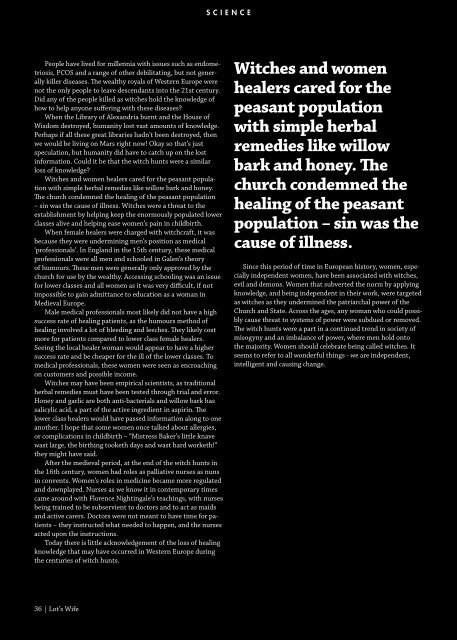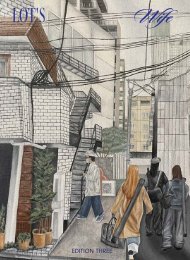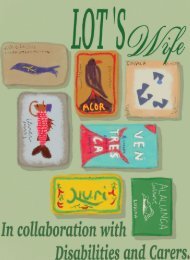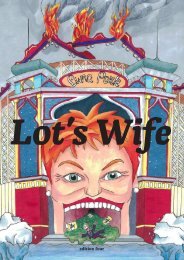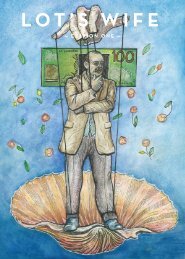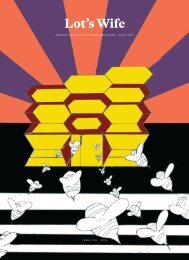Lot's Wife Edition 4 2016
You also want an ePaper? Increase the reach of your titles
YUMPU automatically turns print PDFs into web optimized ePapers that Google loves.
SCIENCE<br />
People have lived for millennia with issues such as endometriosis,<br />
PCOS and a range of other debilitating, but not generally<br />
killer diseases. The wealthy royals of Western Europe were<br />
not the only people to leave descendants into the 21st century.<br />
Did any of the people killed as witches hold the knowledge of<br />
how to help anyone suffering with these diseases?<br />
When the Library of Alexandria burnt and the House of<br />
Wisdom destroyed, humanity lost vast amounts of knowledge.<br />
Perhaps if all these great libraries hadn’t been destroyed, then<br />
we would be living on Mars right now! Okay so that’s just<br />
speculation, but humanity did have to catch up on the lost<br />
information. Could it be that the witch hunts were a similar<br />
loss of knowledge?<br />
Witches and women healers cared for the peasant population<br />
with simple herbal remedies like willow bark and honey.<br />
The church condemned the healing of the peasant population<br />
– sin was the cause of illness. Witches were a threat to the<br />
establishment by helping keep the enormously populated lower<br />
classes alive and helping ease women’s pain in childbirth.<br />
When female healers were charged with witchcraft, it was<br />
because they were undermining men’s position as medical<br />
‘professionals’. In England in the 15th century, these medical<br />
professionals were all men and schooled in Galen’s theory<br />
of humours. These men were generally only approved by the<br />
church for use by the wealthy. Accessing schooling was an issue<br />
for lower classes and all women as it was very difficult, if not<br />
impossible to gain admittance to education as a woman in<br />
Medieval Europe.<br />
Male medical professionals most likely did not have a high<br />
success rate of healing patients, as the humours method of<br />
healing involved a lot of bleeding and leeches. They likely cost<br />
more for patients compared to lower class female healers.<br />
Seeing the local healer woman would appear to have a higher<br />
success rate and be cheaper for the ill of the lower classes. To<br />
medical professionals, these women were seen as encroaching<br />
on customers and possible income.<br />
Witches may have been empirical scientists, as traditional<br />
herbal remedies must have been tested through trial and error.<br />
Honey and garlic are both anti-bacterials and willow bark has<br />
salicylic acid, a part of the active ingredient in aspirin. The<br />
lower class healers would have passed information along to one<br />
another. I hope that some women once talked about allergies,<br />
or complications in childbirth – “Mistress Baker’s little knave<br />
wast large, the birthing tooketh days and wast hard worketh!”<br />
they might have said.<br />
After the medieval period, at the end of the witch hunts in<br />
the 16th century, women had roles as palliative nurses as nuns<br />
in convents. Women’s roles in medicine became more regulated<br />
and downplayed. Nurses as we know it in contemporary times<br />
came around with Florence Nightingale’s teachings, with nurses<br />
being trained to be subservient to doctors and to act as maids<br />
and active carers. Doctors were not meant to have time for patients<br />
– they instructed what needed to happen, and the nurses<br />
acted upon the instructions.<br />
Today there is little acknowledgement of the loss of healing<br />
knowledge that may have occurred in Western Europe during<br />
the centuries of witch hunts.<br />
Witches and women<br />
healers cared for the<br />
peasant population<br />
with simple herbal<br />
remedies like willow<br />
bark and honey. The<br />
church condemned the<br />
healing of the peasant<br />
population – sin was the<br />
cause of illness.<br />
Since this period of time in European history, women, especially<br />
independent women, have been associated with witches,<br />
evil and demons. Women that subverted the norm by applying<br />
knowledge, and being independent in their work, were targeted<br />
as witches as they undermined the patriarchal power of the<br />
Church and State. Across the ages, any woman who could possibly<br />
cause threat to systems of power were subdued or removed.<br />
The witch hunts were a part in a continued trend in society of<br />
misogyny and an imbalance of power, where men hold onto<br />
the majority. Women should celebrate being called witches. It<br />
seems to refer to all wonderful things - we are independent,<br />
intelligent and causing change.<br />
36 | Lot’s <strong>Wife</strong>


